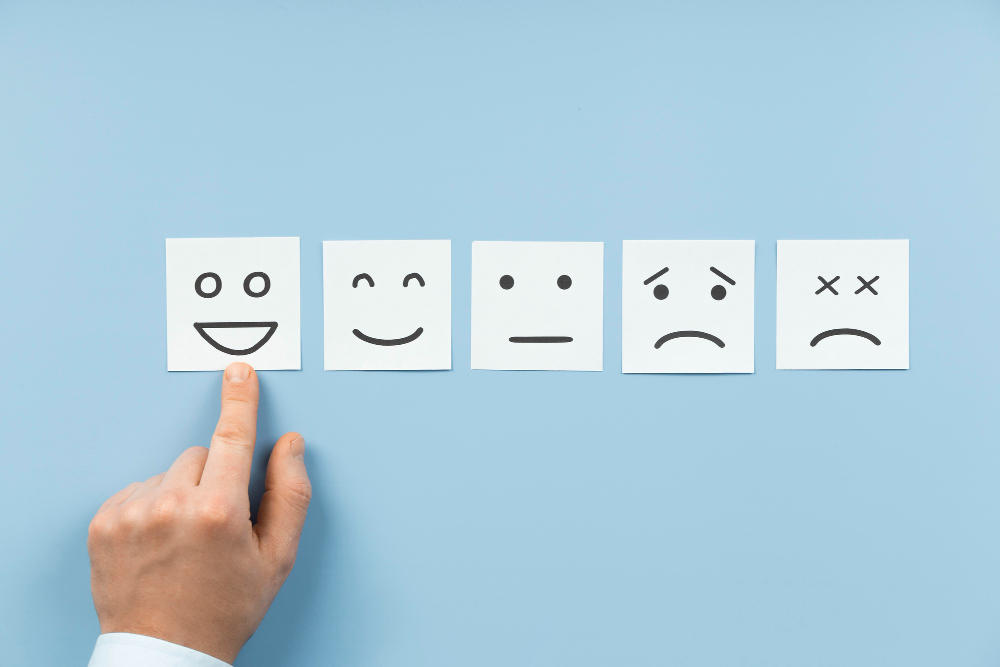The World Mental Health Day is observed globally on the 10th of October.
Former health minister of Malaysia, Dr Zaliha Mustafa reported that one in four Malaysian teenagers had experienced depression according to the 2022 National Health and Morbidity Survey.
Indeed, mental health concerns are arising in our country, not just among adults, but even among young kids too.
That's why it is so important for us to engage in conversations to address them, regardless of our age.
In this article, we will look at five fundamental tips to promote self-care consistently, which will enhance your mental health.

Tip 1: Practice Emotional Regulation
Let's talk about emotions, shall we?
We are often caught in a situation where we are asked to choose between these two: head vs heart. But you can't talk about mental well-being without mentioning the relationship between our minds and emotions. You simply cannot separate them both.
Like it or not, our emotions are often heightened whenever we are facing a stressful or unpleasant situation. Having said that, different people could have different stress triggers and different stress adaptation levels.
Raise your hands if you have experienced sudden emotional outbursts/breakdowns when something unexpected happens. For instance, how many of you have said something hurtful out of anger and instantly regretted it the next moment?
Or are you the type to conceal your emotions and prefer to stay away from any emotional expression while pretending that everything is okay the next day?
If you answered yes to either one of the above descriptions, let us assure you are not alone. And you can absolutely do something about this — emotional regulation.

Image by Freepik
Whenever you feel a sudden surge of emotions and your heart starts racing, the first thing you need to do is pause and take a breath.
Remind yourself that the feelings and emotions you are experiencing right now are indicators and not dictators of your actions.
Be mindful of these emotional changes and the environment that you are currently in. Sometimes, an outburst can be minimised when you reduce certain triggers.
When you feel the emotions, don't just brush them off but instead try to identify the emotion that you are experiencing. At times, anger and hurt could arise due to different factors such as frustration, panic, disgust, shame and even fear.
Accept that these emotions are normal and natural. Tell yourself that you have a choice to respond well with positive emotions.
For example, if your car's battery suddenly goes off in the middle of the road, don't blame yourself and feel that the whole day is ruined. Instead, take a breath and start thinking of what you can do to solve this issue positively.
Remember, emotions are great tools in our everyday life. When used well, they play significant roles in helping us make the right decision, forming good relationships with others and understanding ourselves.
That said, many individuals turn to physical activities and lifestyle changes to have better emotional regulation. You can read more on some practical ways to be healthier and fitter in 2024.
Tip 2: Prioritise Healthy Boundaries & Connection
Have you ever heard of the term "social battery"?
It is commonly used to describe the energy that one has when it comes to social activities and interaction.
Whether it is in your own family or your own circle of friends, you may realise that some individuals can just maintain a high energy level regardless of who they are meeting or what they are doing, while for some, they just feel tired easily.
However, we all know that sometimes meeting and connecting with the wrong people can also drain our energy and affect our mental health in the long run.
That's why we need to establish healthy boundaries in all of our personal and even work relationships.
Some examples of unhealthy boundaries include a blurred line between work and personal time, or the constant need to be the problem solver to a friend's issues and many more.
Remind yourself that you have the right to say no to unhealthy demands, and unrealistic dependence while still being connected to others.
Do not allow the fear of missing out to mislead you into thinking that you have to always be a part of something with someone.
True friends and connections will learn to respect your boundaries and your ways to recharge.
Perhaps, you might want to try out some solitary hobbies or even learn a new sport to sweat it out.
Who knows, you might find a good connection with a fellow sports lover when you take up a new sport.

Image by Drazen Zigic on Freepik

Tip 3: Create Feasible Goals & Stop Comparing With Others
At times, we put too much pressure on ourselves when we set up goals after goals and feel defeated when we cannot achieve them or rather, when we see others achieving more or achieving first.
It's as if all your effort has gone to waste and everything seems meaningless.
That should not be the way.
Whatever goals you set, be it for work or personal development, it is important to note that you should aim for progress and not perfection. And above all, it is not a competition and certainly not a battle of likes on Instagram.
For instance, if you are determined to start a new online business, you should focus more on how to improve product quality, customer engagement and strategies to strengthen your brand image progressively over time.
Don't be swayed by shortcuts or be tempted to compare to online businesses that are of a different category from yours.
Your goals are equally meaningful and achievable if you tailor them according to your ability and needs. Do not make them too difficult to start.
We assure you that this tip will come in handy when you start planning for your New Year's resolutions for the coming year.
Tip 4: Cultivate Good Lifestyle Habits & Fun Hobbies
Another way to enhance your mental health is to start investing in yourself, in terms of your physical fitness, daily habits and also meaningful hobbies.
Sometimes you may feel all alone and bored because you are constantly in a sedentary mode and a fixed routine.
An article by the American Psychological Association reported that about 2.5 hours of brisk walking (in a week) can lower the percentage of depression among adults by 25%.
What you need is probably a new injection of physical activities that will transform your overall lifestyle. You can go out for a brisk walk after dinner, jog during weekends or join a Zumba class if you love music.
Apart from physical activities, your mental health can also be improved with some mind-relaxing activities.
Art-related activities are often used to express creativity, individuality and most importantly, an array of emotions. That's why artists devote so much of their time to complete a piece of artwork and then, some of us can spend all day in art galleries just enjoying them.
Regardless of your current level as an absolute beginner or someone who has some fundamental basics of art, you can pick up an art-related hobby and master it under the guidance of an experienced art tutor.
Perhaps, you can pick up painting or even start a handcraft-related hobby with your family or friends.
One way to get started is to enrol yourself in an art private tutoring class. Depending on your preference and schedule, you can opt for home tutoring or online tutoring.
We highly recommend you to find your next painting tutor or art tutor through a reliable tutoring platform like Superprof.
You just need to key in the subject you plan to learn and your current location, and then you will be directed to a wide selection of experienced tutors. From there, you get to browse through the tutors' profiles and read all their basic information.
After confirming the details, you can proceed to contact them via the messaging features on their profiles.

Photo by Bench Accounting on Unsplash
Tip 5: Celebrate Your Progress (Big and Small) With Gratitude
When it comes to self-care and realising your full potential, it is important to ditch comparison and embrace celebration.
Of course, we are not referring to mega parties and fireworks but a simple celebration here refers to the acknowledgement that you have progressed along the way.
Be thankful that you have taken the first step to care for your mental health.
Whether it is being more intentional about regulating your emotions, reducing unhealthy boundaries, going for regular walks, or completing a watercolour painting.
Of course, it is important to note that progress does not have a definite measure and everyone's timeline is so different. At times, we may not get things done the first time.
Don't dwell on these feelings for too long, but gradually accept the fact that there is always a chance to do things better.
For instance, you wanted to start volunteering at an environmental NGO in the coming year, but you may have missed out on some activities in between.
Instead of counting the amount of activities that you participated in and being fixated on your level of participation, it's important to immerse yourself in every experience.
When you focus more on the process instead of on the outcome, you will realise that you gain more in the long run. A sense of satisfaction and gratitude that it is irreplaceable and incomparable.
We hope these five tips will encourage you to practice self-care and enhance your mental well-being through the highs and lows of your life.
Mental health is not a destination, but a journey. It's about how you drive, and not where you're going
— Professor of Psychology, Noam Shpancer















